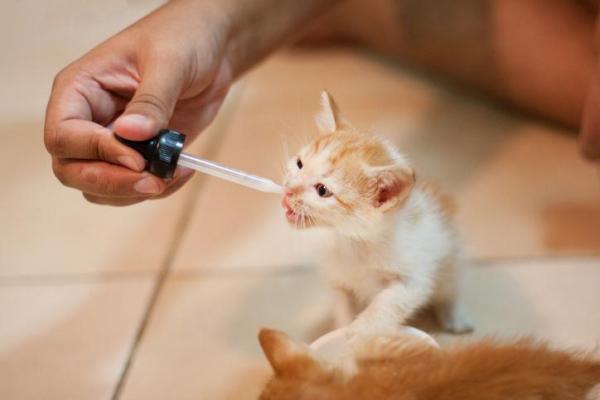Albendazole for Cats - Uses, Dosage and Side Effects



See files for Cats
Albendazole for cats is a common and well-known product for its antiparasitic effect. Specifically, it acts against various types of internal parasites. Its current veterinary uses is more common as a dewormer in cattle, so it is not necessarily a deworming agent which will be prescribed by your veterinarian for your cat. However, it is a drug available to your veterinarian and it has known efficacy for various types of internal parasites in cats.
At AnimalWised, we learn more about the specific uses of albendazole for cats. We also look at its potential side effects and contraindications so you can know how effective a treatment it is for your feline.
What is albendazole for cats?
Albendazole for cats is a product with an antiparasitic effect. It belongs to the chemical class of benzimidazoles. These are organic compounds which are traded under better-known dewormers such as febantel or fenbendazole. These are also used against internal parasites. These are products that have been used since the 1960s, although albendazole, only began to be administered in the 70s.
The first benzimidazoles had an effect against adults and larvae of gastro-intestinal worms. The latter broadened the spectrum. Some, including the albendazole detailed in this article, manage to pass from the intestine into the blood. This means they can also eliminate worms outside the digestive system, such as those that lodge in the lungs or heart.
Albendazole is both an anthelmintic and antiprotozoal drug. This means it acts on parasitic worms and protozoa, respectively. This means they can be effective on nematodes, cestodes or tapeworms, as well as trematodes and giardia. All of these are internal parasites that lodge themselves in the digestive system. Some specific types of internal parasites in cats such as Toxocara spp., Ancylostoma spp. or Trichuris spp. and be treated with albendazole.
The specific action of albendazole is the prevention of digestive enzyme function in these types of parasites. Since they cannot metabolize the glucose they need for maintaining life, they will die as a result.
Learn more about different parasitical issues in felines with our article on types of intestinal parasites in cats.
Albendazole for cats uses
The main use of albendazole is the internal deworming of cats. Establishing both an external and internal preventive deworming schedule for cats is a core responsibility of cat guardianship. It helps protect the cats from potentially life threatening illnesses caused by various types of parasites. Even if they live in a home without access to the outside, cats can become infested due to parasites entering the home from various sources.
Unfortunately, albendazole for cats does not have a residual effect. This means it is not a good deworming agent for preventive purposes in cats. For preventive deworming, you will need to speak to a veterinarian who will be able to establish the correct deworming agent for both your cat's specific needs and those of the region in which you live. Generally speaking, a deworming schedule for cats will need to be updated every 3-4 months.
Although not a good preventive dewormer, albendazole is very effective at killing various parasites after an infestation. We may see the symptoms of a parasitical infestation due to the cat vomiting and having diarrhea, among many other symptoms. In many cases, the process may be asymptomatic. It will only be once we go to a veterinarian for examination can we confirm the type of parasite. If the parasite is one which can be killed with albendazole, it is possible the veterinarian will prescribe this drug for your cat.
Albendazole for cats dosage
Albendazole can be found in the following preparations:
- Oral tablets
- Oral liquid suspension
The preparation of albendazole used for your cat will be determined by the veterinarian. Generally speaking, young kittens will be given the drug in oral suspension with the use of a syringe. Adults may be given tablets. Both forms of albendazole should be given with food as it allows for better absorption of the drug. Learn more with our article on how to give a pill to a cat.
The dose will depend on the format of the drug and the parasite to be eliminated. Some presentations come in a syringe pre-dosed by weight. It is very important to weigh the cat so that the dose of albendazole is both appropriate and effective. Some albendazole can be given in droppers, making it easy to dose and add to food or water.
Depending on each case, the dose can be single or repeated for several days in a row. This is usually around 5 days. It may also be necessary to do more than one deworming as its efficacy can be better with multiple doses. Our vet will tell us the guideline to follow.
Albendazole for cats side effects
As with albendazole for dogs, albendazole for cats is considered a relatively safe drug. It is not known to have many side effects, although there is the potential for a decreased appetite. Although, it is rare, it is possible that that the use of albendazole may be related to anemia in cats.
As in most antiparasitic products, it is possible to observe adverse effects after administration such as vomiting or diarrhea, as well as weakness and lethargy in the cat.

Contraindications of albendazole for cats
In terms of contraindications for using albendazole in cats, it should not be administered to kittens before two weeks of age. It is also not recommended for pregnant cats because it could cause malformations in the kittens and abortions. In addition, special care must be taken with cats that suffer from liver problems.
This article is purely informative. AnimalWised does not have the authority to prescribe any veterinary treatment or create a diagnosis. We invite you to take your pet to the veterinarian if they are suffering from any condition or pain.
If you want to read similar articles to Albendazole for Cats - Uses, Dosage and Side Effects, we recommend you visit our Medicine category.
- Look, G. (2012). Importance and clinical management of giardiasis in the small animal clinic. Veterinary Portal.






